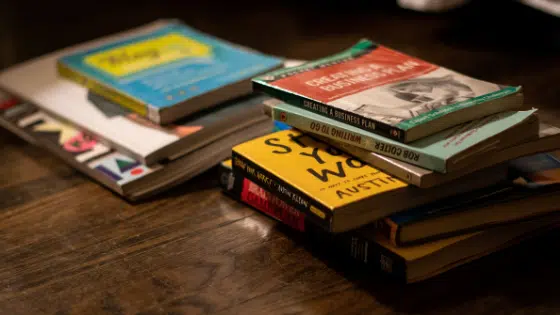Books and introverts naturally gravitate toward each other. It’s like the attraction of two magnets.
The world already has a ton of books for musicians who want to get better at performing or schmoozing or marketing. But what about the introverted musicians who love to stay home, write songs, and produce tracks?
Welcome, introverts. This post is for you. Here are four music books that I think you’ll love.
How to Make It In The New Music Business by Ari Herstand
If you’re a singer-songwriter or producer who loves to be holed up in your studio, there’s plenty of great content in this book for you.
Herstand talks about the philosophy of multiple income streams and doing music from home. There’s an entire chapter on recording, both in regard to being in the right headspace and learning the technical side of things. Following that, he walks you through, step-by-step, how to release the music you’ve recorded.
Want to get your music placed in TV and film? There are instructions on how to do that.
Want to make sure you get paid all the royalties you deserve? This book will tell you how.
Oh, and the internet? There’s a whole section on learning how to be a successful musician online.
Steal Like an Artist by Austin Kleon
This book is all about creating, which is something you usually do by yourself. Perfect for homebodies.
Kleon labels himself as a writer who draws, saying, “I make art with words and books with pictures.” And if you like books with lots of pictures, this is your type of read.
The overarching idea of this book is to recycle what you consume to make your own art. Steal things — not in the “I’m going to plagiarize this” type of way, but in the “I’m going to intentionally let this art influence my own art.”
It’s both an inspirational book for worn-out artists and a practical book for the day-to-day of creating. Kleon says you should just start creating, even if you “don’t know who you are” or you’re not feeling inspired.
But if you do want to feel inspired, he suggests visiting (or moving to) a new city, taking a break to work on a hobby, or consuming someone else’s art.
Then when you do start making something, you should “write the book you want to read.” And for musicians, that means making music you wish existed.
Show Your Work! by Austin Kleon
The subtitle to Show Your Work! is “10 Ways to Share Your Creativity and Get Discovered.” And thankfully, if you’re an introvert, you can do this very well from the comfort of your home.
He says this book is “about influencing others by letting them steal from you.” He fleshes out this idea by talking about 10 ways you should rethink your creative process.
He says creating is a never-ending thing — a thing that you should share with fans as you go. Creating is all about the process, not the results. Humans can tend to be very results-driven, but in this book, Kleon says we should be process-driven. How can you change your process to create better work? And isn’t the process part of the work?
He encourages the reader to regularly share something with people (via social media, your email list, by text, etc), even if it’s not finished. You shouldn’t become sale-sy, but you should include fans in your process somehow.
It’s also full of encouragement and inspiration for anyone who creates, especially musicians.
Drops Like Stars by Rob Bell
Rob Bell is a writer, philosophizer, and ex-pastor. And this book is a deep and profound look at how creativity and suffering interact with each other.
If, like most introverts, you enjoy reading books, you probably also like to think about ideas and intellectualize about stuff. And that’s what this book offers — thoughts and theories on difficulty in life and how that affects your creativity.
“It is the difficult and the unexpected, and maybe even the tragic, that opens us up and frees us to see things in new ways,” says Bell’s website. “Many of the most significant moments in our lives come not because it all went right but because it all fell apart. Suffering does that. It hurts, but it also creates.”
He talks about how disruption leads to a deeper creativity, how subtraction is a creative process, and how failing can make you get better at what you do.
You may think it’s too heavy, but it’s worth a read (plus, it’s short).



